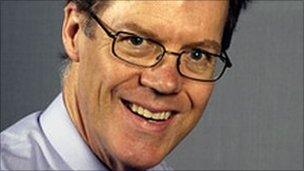Wikileaks 'should lead to greater transparency'
- Published

Mr Graham said it would be "nonsense" for ministers to clam up because of Wikileaks
Ministers should be more transparent and resist any urge to "clam up" after the Wikileaks revelations, according to the information commissioner.
Christopher Graham said the government should be more proactive in publishing communications after the release of thousands of secret documents online.
He said ministers needed to "wise up" to the fact that almost any official document could now be made public.
He told The Guardian: "Where you're open things will not be Wikileaked."
Mr Graham, who became information commissioner in June 2009, added: "Whatever view you take about Wikileaks - right or wrong - it means that things will now get out.
"It has changed things. I'm saying government and authorities need to factor it in. Be more proactive, publishing more stuff, because quite a lot of this is only exciting because we didn't know it.
"You can't un-invent Wikileaks. Wikileaks is part of the phenomenon of the online, empowered citizen... these are facts that aren't going to go away.
"Government and authorities need to wise up to that."
Wikileaks, external and its founder Julian Assange have faced criticism for the release of thousands of sensitive cables between the US State Department and hundreds of American diplomatic outposts around the world.
'Strike a balance'
Mr Graham, a former secretary of the BBC, said he opposed the indiscriminate leaking of information.
He continued: "The difference between what I do and what Julian Assange does is the difference between freedom of information and free-for-all.
"Freedom of information accepts that there are some things where you need to strike a balance. The free-for-all says isn't this exciting, we didn't know it - never mind the casualties. Life is much more complicated than that."
Mr Graham urged ministers not to react to the disclosures by trying to control information more tightly.
"One response is that they will clam up and not write anything down, which is nonsense, you can't run any organisation that way," he said.
"The other is to be even more open. The best form of defence is transparency - much more proactive publication of what organisations do.
"It's an attitude of 'OK. You want to know? Here it is'."